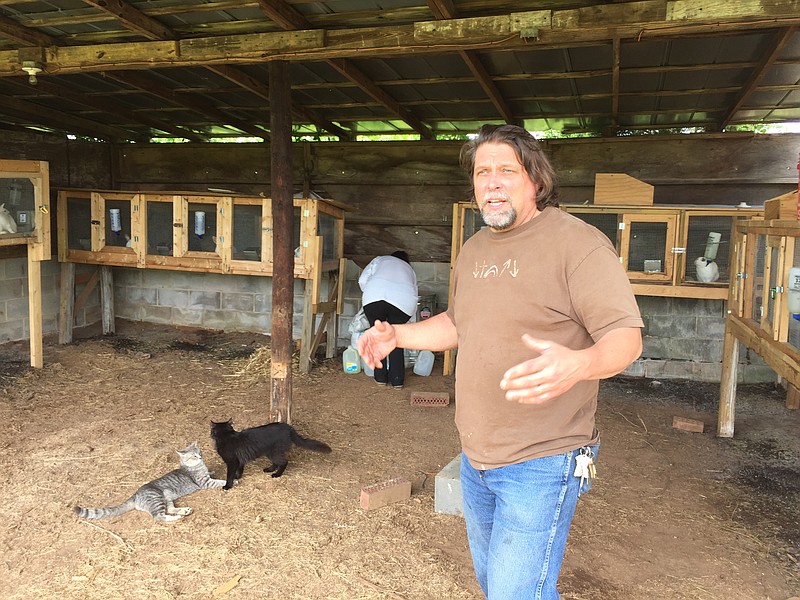A local ministry to homeless people is facing its own troubles finding a home for a community of tiny houses it wants to develop in Ooltewah where residents can live and work, raising food for themselves and others.
City and county planners Monday chopped down plans by the Mustard Tree Ministries for a planned unit development of 32 tiny homes proposed to be built on a 16.8-acre farm at Snow Hill and Mahan Gap Roads. By a 13-2 vote, the Chattanooga/Hamilton County Regional Planning Commission recommended against allowing the United Methodist Church-backed ministry to build a cluster of 300-square-foot homes on a farm once used to house the Lighthouse United Methodist Church at the corner of Snow Hill and Mahan Gap roads.
Mike Purcell, a board member of the Mustard Tree Ministries, said the community of tiny homes would total no more than the number of homes allowed on the property under its current agricultural zoning. He said the complex would help provide needed, affordable housing for those coming off of being homeless and wanting to live in a rural setting.
"There is an increasing need for affordable housing in the Chattanooga area," Purcell told the planning commission, noting that the tiny homes could rent for about $300 or so a month to help formerly homeless people who are finding jobs and rebuilding their lives.
Purcell said the project is patterned after the Community First Village near Austin, Texas, a 27-acre complex of tiny homes on an organic, working farm that helps to feed both residents and other ministries.
But the advisory planning board voted against the planned unit development after more than 1,800 petition signatures were presented in opposition to the project from three different homeowner groups in the area. Ooltewah-area residents complained the development would devalue their property and could even endanger their children.
Mahan Gap Road homeowner Dean Morehouse said the prospect of a community of tiny homes for homeless people has created a furor in Ooltewah, which is the third wealthiest ZIP code in Hamilton County behind only the ZIP codes on Lookout and Signal mountains.
"I've lived here for about 25 years and I've got to tell you I've never seen such an uproar in this community," he said. "This project is an inappropriate use of this land and will hurt our property values."
Debbie Petticord, who lives across the road from the project, said the site "is perfect for cows and horses." But she questioned whether the soil could support 32 more houses on the septic tank system erected nearly a decade ago when the Lighthouse church opened with a temporary facility on the site.
The church ultimately closed more than four years ago, but the head of Mustard Tree Ministries, Barry Kidwell, said the former church driveway and septic tank system on the site could be used for the tiny home subdivision. Kidwell said the farm of vegetable crops, chickens, rabbits and goats can help employ many of those served by the ministry and who might live in the tiny homes.
But neighbors said the low-cost housing might hurt their property values and not be as attractive as other homes and farms in the area.
"If this is built in my viewshed, it will be similar to looking at a trailer park," Petticord said.
John Harris, managing director of the citizens group known as Ooltewah Citizens for Responsible Growth, said the site is too far away from the health care services, job programs and public transportation needed by those served by the Mustard Tree Ministries.
"The population this ministry is serving needs to be in an urban environment where drug counseling, health care assistance, local grocery stores and CARTA buses are available," Harris said. "You wouldn't build a marina in a place where there isn't any water."
Harris said the planned unit development would set a poor precedent for the area, "so we'll fight this in court or otherwise, if we have to."
Even those who said they support the ministry questioned the location of the tiny homes community.
"I am very sympathetic to this cause, but this is spot zoning any way we cut it," said Don Moon, a member of the planning commission.
The Hamilton County Commission will decide on the planned unit development request next month. Purcell and Kidwell said they will continue to try to meet with neighbors and others to try to convince them of the value of the project and how it would fit in the area.
"What I don't think is fair is for so many people to be opposed to this PUD (planned unit development) not because of what it is, but because of who might live there," Purcell said after the meeting. "We shouldn't discriminate against people and where they can live because of their socioeconomic background."
Contact staff writer Dave Flessner at dflessner@timesfreepress.com or at 423-757-6340.
